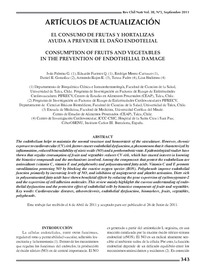El consumo de frutas y hortalizas ayuda a prevenir el daño endotelial
Autor
Palomo, Iván
Fuentes, Eduardo
Moore-Carrasco, Rodrigo
González, Daniel R.
Padro, Teresa
Badimon, Lina
Fecha
2011Resumen
The endothelium helps to maintain the normal structure and homeostasis of the vasculature. However, chronic exposure to cardiovascular (CV) risk factors causes endothelial dysfunction, a phenomenon that is characterized by inflammation, reduced bioavailability of nitric oxide (NO) and a prothrombotic state. Epidemiological studies have shown that regular consumption of fruits and vegetables reduces CV risk, which has caused interest in knowing the bioactive compounds and the mechanisms involved. Among the components that protect the endothelium are antioxidants (vitamin C, vitamin E and polyphenols) and polyunsaturated fatty acids. Vitamin C and E promote vasodilatation protecting NO by blocking the reactive oxygen species (ROS). Polyphenols improve endothelial function primarily by increasing levels of NO, and inhibition of angiogenesis and platelet activation. Diets rich in polyunsaturated fatty acids have shown beneficial effects by reducing the gene expression of cyclooxygenase-2 and the expression of cell adhesion molecules. This review mainly highlights the current understanding of endothelial dysfunction and the protective effect of endothelial cells by bioactive components of fruits and vegetables.
Fuente
Revista Chilena de Nutrición, 38(3), 343-355Identificador DOI
dx.doi.org/10.4067/S0717-75182011000300010Colecciones
La publicación tiene asociados los siguientes ficheros de licencia:



